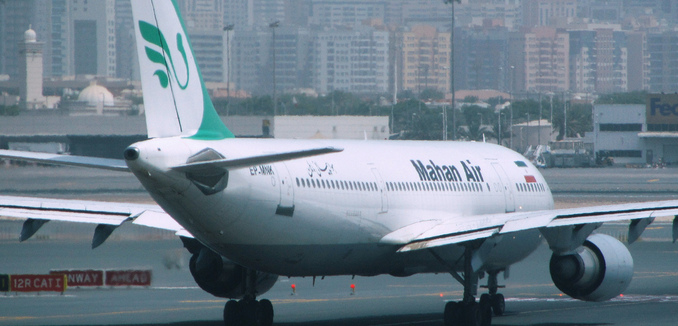Germany barred Iran’s Mahan Air from landing in German airports over concerns that the planes are used to transport arms and soldiers to Syria, euronews reported Monday. Germany took the action as tensions between the European Union and Iran have been rising over the Islamic Republic’s support for terror on foreign soil and its growing missile threat.
Christofer Burger, spokesman for Germany’s Foreign Ministry, said that the action was taken in order to protect the nation’s “foreign and security policy interests.”
According to a foreign ministry spokeswoman, Mahan was sent a notification “ordering the immediate suspension of its authorisation to operate passenger flights from and to Germany” as of Monday.
Mahan Air, which is officially a commercial airline, was sanctioned in 2011 by the U.S. Treasury Department for “providing financial, material and technological support to the Islamic Revolutionary Guard Corps-Quds Force (IRGC-QF). ”
Mahan is Iran’s second largest airline after Iran Air, and it had routes to the German cities of Düsseldorf and Munich.
Germany denied that its ban on Mahan was due to U.S. pressure or that it would subject Iran to wider-ranging sanctions.
“The German decision is based on considerations of our security needs,” Steffen Seibert, a German government spokesman, said.
“It cannot be ruled out that this airline could also transport cargo to Germany that threatens our security. This is based on knowledge of past terrorist activities by Iran in Europe,” he added.
Germany’s ban on Mahan Air comes on the heels of a Reuters report that a meeting earlier this month between EU representatives and Iranian officials ended with the Iranians storming out and slamming the door.
French, British, German, Danish, Dutch, and Belgian diplomats had conveyed a message to Iranian foreign ministry officials that the EU would no longer tolerate Iran’s ballistic missile tests or terror plots on European soil.
The Iranians, according to Reuters, “abruptly stood up, walked out and slammed the door in an extraordinary break with protocol.”
No Iranians commented on the incident, but one European diplomat said, “There was a lot of drama, they didn’t like it, but we felt we had to convey our serious concerns.” A second diplomat added, “It shows the relationship is becoming more tense.”
Earlier this month, the Dutch government accused Tehran of hiring criminals to assassinate an opposition figure in Amsterdam in late 2017, and the EU imposed sanctions on Iran’s Ministry of Intelligence for a widespread campaign of assassination plots across Europe.
In October, Denmark pushed for Europe to impose sanctions on Iran, after foiling an Iranian plot to kill dissidents in the Scandinavian nation.
In June of last year, France, Germany, and Belgium foiled a planned attack against a meeting of thousands of Iranian opposition supporters just north of Paris that was also attended by leading U.S. figures. An Iranian diplomat, accredited to Tehran’s mission in Austria, was implicated in the plot.
[Photo: Kurush Pawar / Flickr ]




